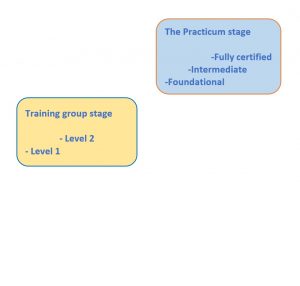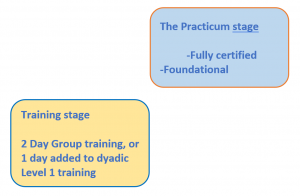The Theraplay training programme has two major stages.
The first stage consists of the Level 1 and Level 2 (or Group) trainings. Typically there are 12 or 24 participants at these events.
The second stage is called the Practicum, and is a more individual training experience guided by a Theraplay supervisor.
Dyadic Theraplay Stages
Group Theraplay Stages
Levels 1 and level 2 or Group trainings
 The four day Level One Training is designed to teach you the basics to begin using ‘Theraplay principles and techniques in your work’ with clients. (Trainings often have an added extra ‘Group’ day).
The four day Level One Training is designed to teach you the basics to begin using ‘Theraplay principles and techniques in your work’ with clients. (Trainings often have an added extra ‘Group’ day).
This is followed by the two day Level Two training which extends these skills in several ways including administering and interpreting the Theraplay assessment process, working with trauma and complex families and working with parents and carers.
Alternatively, the two day Group Theraplay training enables participants to apply Theraplay principles in a group intervention, typically in a school, day care, nursery or residential setting.
If you work in a school, please consider whether Level 1(which is mainly about working on the parent/child relationship) or the 2 day Group Theraplay® is the most suitable training for your context.
For more information on these trainings, click here
To see a short video on what to expect from a Theraplay Level 1 or 2 training,
The Practicum
This is an individual training route and the key feature is that a supervisor is allocated to you in order to provide you with the highest level of professional support to acquire the skills and knowledge about the Theraplay modality.
You will work through foundational and intermediate certification levels to the final ‘fully certified therapist’ status and TTI recommends that all practitioners complete at least to the Foundational Certification for best practice
For more information on the practicum click here or see the Practicum pages of the website.
Theraplay training feedback
“If you’re looking for the one best-practice, trauma-informed care technique for working with children and families, Theraplay is it! The training exponentially expanded my understanding and hands-on ability to promote healing!”
Comments from previous training participants:
- “The best four days of training I’ve ever had.”
- “I was positively surprised by the depth of information I’ve gained from this training.”
- “The trainers were very experienced, knowledgeable about a wide range of interventions and complexities of families, children and trauma. They work in the “real” world. They are very capable and have great depth to their training. This was an expensive training for my agency but well worth it.”
- “Just a very enjoyable day and intensive four days of interactive learning. Trainers were clearly knowledgeable and able to convey their knowledge and passion for Theraplay theory and practice to course attendees.”
- “Great inspiring course. Would recommend to all.”
- “So much great information and excellent tools that can be used right away. I am a better therapist because of this training!”
Ann Jernberg developed the Theraplay method in Chicago in the 1960’s. Traditional approaches to supporting children who were struggling to access education and experiencing poor emotional wellbeing involved trying to determine what was going wrong for them. Jernberg, however, felt that considering what was going right for children who were thriving, could inform a pragmatic and practical way to address any difficulties other children may be experiencing. This approach was particularly effective when supporting children whose difficulties were partly, or wholly, connected to their difficulty staying in relational contact with the grown ups who were there to help them. Using her observational skills and theoretical understanding, she identified four main ways in which healthy parent/child relationships could be understood; how does the dyad cope with Nurture, Engagement, Structure and Challenge. From these four dimensions, Theraplay seeks to understand what is going well in adult/child relational dyads and build on that by addressing the dimensions that would be even better, if strengthened. The consistent finding from research is that it is the quality of the relationship that indicates the effectiveness of any therapeutic encounter, more than the specific method used. Theraplay is a way of supporting, growing and embedding positive relational experiences for children and their caregivers. This, in turn, provides the platform for increased emotional well being, while enhancing a child’s capacity to engage with the care that adults can offer to them. This method grew from attachment theory and the efficacy and understanding of supporting positive attachment experiences is also affirmed by the narratives that are emerging from modern, neuroscientific ways of studying human development.
In other words, Theraplay is about building relationships from the inside out.


